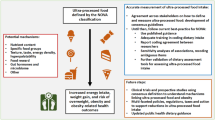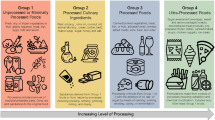Abstract
Trans fatty acids from partially hydrogenated vegetable oils provide 2% to 3% of daily energy in the United States. Evidence from controlled feeding studies indicates that consumption of trans fatty acids produces harmful changes in lipid profiles, systemic inflammation, endothelial function, and possibly other markers of cardiovascular risk. Evidence from prospective observational studies has demonstrated strong positive associations between trans fat intake and risk of coronary heart disease and possibly higher risks of diabetes and obesity. Educating the public about the sources and hazards of trans fats, combined with voluntary use of trans-free alternatives by restaurants and food manufacturers and possibly legislation that limits their use, could avert thousands of coronary heart disease events each year in the United States.
Similar content being viewed by others
References and Recommended Reading
Allison DB, Egan SK, Barraj LM, et al.: Estimated intakes of trans fatty and other fatty acids in the US population. J Am Diet Assoc 1999, 99:166–174.
Stender S, Dyerberg J, Astrup A: High levels of industrially produced trans fat in popular fast foods. N Engl J Med 2006, 354:1650–1652.
Dietary Guidelines Advisory Committee: 2005 Dietary Guidelines Advisory Committee Report. http://www.health.gov/dietaryguidelines/dga2005/report/. Accessed November 2, 2006.
Clandinin MT, Cheema S, Field CJ, et al.: Dietary fat: exogenous determination of membrane structure and cell function. FASEB J 1991, 5:2761–2769.
Feller SE, Gawrisch K: Properties of docosahexaenoic-acid-containing lipids and their influence on the function of rhodopsin. Curr Opin Struct Biol 2005, 15:416–422.
Roach C, Feller SE, Ward JA, et al.: Comparison of cis and trans fatty acid containing phosphatidylcholines on membrane properties. Biochemistry 2004, 43:6344–6351.
Vanden Heuvel JP: Diet, fatty acids, and regulation of genes important for heart disease. Curr Atheroscler Rep 2004, 6:432–440.
Hotamisligil GS: Role of endoplasmic reticulum stress and c-Jun NH2-terminal kinase pathways in inflammation and origin of obesity and diabetes. Diabetes 2005, 54(Suppl 2):S73–S78.
Dashti N, Feng Q, Freeman MR, et al.: Trans polyunsaturated fatty acids have more adverse effects than saturated fatty acids on the concentration and composition of lipoproteins secreted by human hepatoma HepG2 cells. J Nutr 2002, 132:2651–2659.
Mitmesser SH, Carr TP: Trans fatty acids alter the lipid composition and size of apoB-100-containing lipoproteins secreted by HepG2 cells. J Nutr Biochem 2005, 16:178–183.
Matthan NR, Welty FK, Barrett PH, et al.: Dietary hydrogenated fat increases high-density lipoprotein apoA-I catabolism and decreases low-density lipoprotein apoB-100 catabolism in hypercholesterolemic women. Arterioscler Thromb Vasc Biol 2004, 24:1092–1097.
Mauger JF, Lichtenstein AH, Ausman LM, et al.: Effect of different forms of dietary hydrogenated fats on LDL particle size. Am J Clin Nutr 2003, 78:370–375.
Ascherio A, Katan MB, Zock PL, et al.: Trans fatty acids and coronary heart disease. N Engl J Med 1999, 340:1994–1998.
Mensink RP, Zock PL, Kester AD, et al.: Effects of dietary fatty acids and carbohydrates on the ratio of serum total to HDL cholesterol and on serum lipids and apolipoproteins: a meta-analysis of 60 controlled trials. Am J Clin Nutr 2003, 77:1146–1155.
van Tol A, Zock PL, van Gent T, et al.: Dietary trans fatty acids increase serum cholesterylester transfer protein activity in man. Atherosclerosis 1995, 115:129–134.
Han SN, Leka LS, Lichtenstein AH, et al.: Effect of hydrogenated and saturated, relative to polyunsaturated, fat on immune and inflammatory responses of adults with moderate hypercholesterolemia. J Lipid Res 2002, 43:445–452.
Mozaffarian D, Rimm EB, King IB, et al.: trans fatty acids and systemic inflammation in heart failure. Am J Clin Nutr 2004, 80:1521–1525.
Baer DJ, Judd JT, Clevidence BA, et al.: Dietary fatty acids affect plasma markers of inflammation in healthy men fed controlled diets: a randomized crossover study. Am J Clin Nutr 2004, 79:969–973.
Lopez-Garcia E, Schulze MB, Meigs JB, et al.: Consumption of trans fatty acids is related to plasma biomarkers of inflammation and endothelial dysfunction. J Nutr 2005, 135:562–566.
de Roos NM, Bots ML, Katan MB: Replacement of dietary saturated fatty acids by trans fatty acids lowers serum HDL cholesterol and impairs endothelial function in healthy men and women. Arterioscler Thromb Vasc Biol 2001, 21:1233–1237.
Matthan NR, Cianflone K, Lichtenstein AH, et al.: Hydrogenated fat consumption affects acylation-stimulating protein levels and cholesterol esterification rates in moderately hypercholesterolemic women. J Lipid Res 2001, 42:1841–1848.
Saravanan N, Haseeb A, Ehtesham NZ, et al.: Differential effects of dietary saturated and trans-fatty acids on expression of genes associated with insulin sensitivity in rat adipose tissue. Eur J Endocrinol 2005, 153:159–165.
Mozaffarian D, Pischon T, Hankinson SE, et al.: Dietary intake of trans fatty acids and systemic inflammation in women. Am J Clin Nutr 2004, 79:606–612.
Mozaffarian D, Katan MB, Ascherio A, et al.: Trans fatty acids and cardiovascular disease. N Engl J Med 2006, 354:1601–1613.
Libby P, Ridker PM, Maseri A: Inflammation and atherosclerosis. Circulation 2002, 105:1135–1143.
Ridker PM, Hennekens CH, Buring JE, et al.: C-reactive protein and other markers of inflammation in the prediction of cardiovascular disease in women. N Engl J Med 2000, 342:836–843.
de Roos NM, Schouten EG, Scheek LM, et al.: Replacement of dietary saturated fat with trans fat reduces serum paraoxonase activity in healthy men and women. Metabolism 2002, 51:1534–1537.
Kavanagh K, Jones K, Sawyer J, et al.: Trans fat diet induces insulin resistance in monkeys [abstract number 328-OR]. Presented at the American Diabetes Association annual meeting. Washington, DC; June 9–13, 2006.
Oh K, Hu FB, Manson JE, et al.: Dietary fat intake and risk of coronary heart disease in women: 20 years of follow-up of the nurses’ health study. Am J Epidemiol 2005, 161:672–679.
Oomen CM, Ocke MC, Feskens EJ, et al.: Association between trans fatty acid intake and 10-year risk of coronary heart disease in the Zutphen Elderly Study: a prospective population-based study. Lancet 2001, 357:746–751.
Pietinen P, Ascherio A, Korhonen P, et al.: Intake of fatty acids and risk of coronary heart disease in a cohort of Finnish men. The Alpha-Tocopherol, Beta-Carotene Cancer Prevention Study. Am J Epidemiol 1997, 145:876–887.
Roberts TL, Wood DA, Riemersma RA, et al.: trans isomers of oleic and linoleic acids in adipose tissue and sudden cardiac death. Lancet 1995, 345:278–282.
Lemaitre RN, King IB, Raghunathan TE, et al.: Cell membrane trans-fatty acids and the risk of primary cardiac arrest. Circulation 2002, 105:697–701.
Lemaitre RN, King IB, Mozaffarian D, et al.: Plasma phospholipid trans fatty acids, fatal ischemic heart disease, and sudden cardiac death in older adults: the cardiovascular health study. Circulation 2006, 114:209–215.
Koh-Banerjee P, Chu NF, Spiegelman D, et al.: Prospective study of the association of changes in dietary intake, physical activity, alcohol consumption, and smoking with 9-y gain in waist circumference among 16 587 US men. Am J Clin Nutr 2003, 78:719–727.
Field AE, Willett WC, Lissner L, et al.: Dietary fat and weight gain among women in the Nurses Health Study. Obesity 2007, In press.
van Dam RM, Rimm EB, Willett WC, et al.: Dietary patterns and risk for type 2 diabetes mellitus in U.S. men. Ann Intern Med 2002, 136:201–209.
Meyer KA, Kushi LH, Jacobs DR, Jr., et al.: Dietary fat and incidence of type 2 diabetes in older Iowa women. Diabetes Care 2001, 24:1528–1535.
Hu FB, Manson JE, Stampfer MJ, et al.: Diet, lifestyle, and the risk of type 2 diabetes mellitus in women. N Engl J Med 2001, 345:790–797.
Lock AL, Bauman DE: Modifying milk fat composition of dairy cows to enhance fatty acids beneficial to human health. Lipids 2004, 39:1197–1206.
Jakobsen MU, Bysted A, Andersen NL, et al.: Intake of ruminant trans fatty acids and risk of coronary heart disease-an overview. Atheroscler Suppl 2006, 7:9–11.
Willett WC, Stampfer MJ, Manson JE, et al.: Intake of trans fatty acids and risk of coronary heart disease among women. Lancet 1993, 341:581–585.
U.S. Food and Drug Administration: FDA Acts to Provide Better Information to Consumers on Trans Fats. http://www.fda.gov/oc/initiatives/transfat/. Accessed Aug 12, 2005.
Nielsen K: Is the quality and cost of food affected if industrially produced trans fatty acids are removed? Atheroscler Suppl 2006, 7:61–62.
Federal Register: Food Labeling: Trans Fatty Acids in Nutrition Labeling. http://www.cfsan.fda.gov/:_lrd/fr03711a.html. Accessed November 2, 2006.
U.S. Department of Health and Human Services, U.S. Department of Agriculture: Dietary Guidelines for Americans, 2005. http://www.health.gov/dietaryguidelines/dga2005/document/. Accessed November 2, 2006.
Leth T, Jensen HG, Mikkelsen AA, et al.: The effect of the regulation on trans fatty acid content in Danish food. Atheroscler Suppl 2006, 7:53–56.
Health Canada: Government response to the interim recommendations of the trans fat task force. http://www.hc-sc.gc.ca/fn-an/nutrition/gras-trans-fats/government_response_reponse_gouvernement_e.html. Accessed November 2, 2006.
Aro A: The scientific basis for trans fatty acid regulationsis it sufficient? A European perspective. Atheroscler Suppl 2006, 7:67–68.
North Carolina General Statutes, Chapter 115C: Elementary and Secondary Education. http://www.ncga.state.nc.us/enactedlegislation/statutes/html/bysection/chapter_115c/gs_115c-264.html. Accessed November 2, 2006.
New York City Department of Health and Mental Hygiene: Press release: Health Department proposes two changes to city’s health code for public comment: first, to phase out artificial trans fat in all restaurants; second, to require calorie labeling in some restaurants. http://www.nyc.gov/html/doh/html/pr2006/pr093-06.shtml. Accessed November 2, 2006.
Center for Science in the Public Interest: Petition for rulemaking to revoke the authority for industry to use partially hydrogenated vegetable oils in foods. http://cspinet.org/new/pdf/trans_fat_petition_may_18.pdf. Accessed November 2, 2006.
Author information
Authors and Affiliations
Corresponding author
Rights and permissions
About this article
Cite this article
Willett, W.C., Mozaffarian, D. Trans fats in cardiac and diabetes risk: An overview. Curr Cardio Risk Rep 1, 16–23 (2007). https://doi.org/10.1007/s12170-007-0004-x
Published:
Issue Date:
DOI: https://doi.org/10.1007/s12170-007-0004-x




